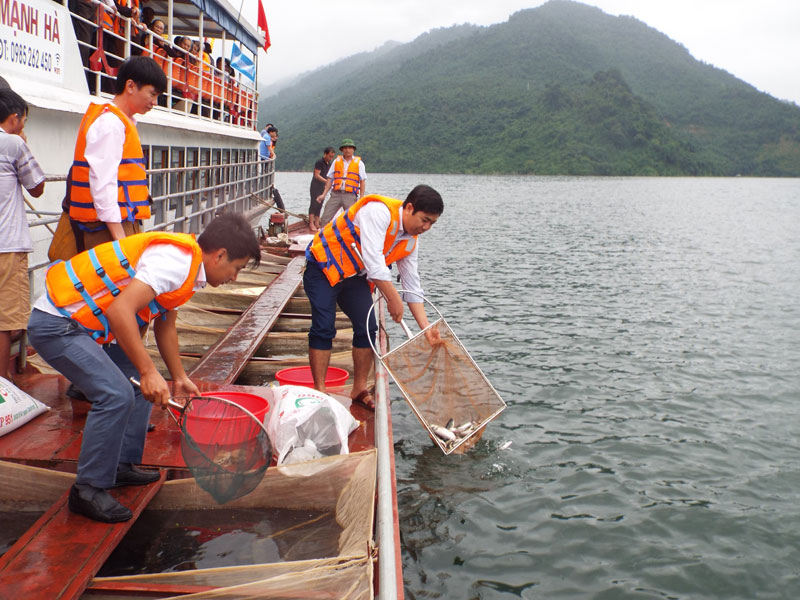
(HBO) – A recent ceremony to release fishes to Hoa Binh reservoir has drawn a large number of Buddhist monks, nuns and followers as well as the local administration and management agencies. The release, funded by businesses, monks, nuns and followers, sees over 60,000 fingerlings of different kinds swimming into the lake.

Organisations join the activity of
releasing fishes to develop aquatic resources in Da River.
Covering a total area of 8,892 hectares, Hoa Binh Reservoir
in Hoa Binh province is considered as a precious source of aquatic species of the
northwestern region with many valuable fish species such as "chien” (Bagarius
bagarius), "bong” (Spinibarbus denticulatus), "lang” (Bagridae), "dam xanh”
(Kyphosidae), "anh vu” (Semilabeo notabilis), and many others.
Aquaculture has helped thousands of local families
reduce poverty and improve their living conditions.
Localities along the banks of the lake have launched a
number of communications activities to protect and develop aquatic resources sustainably,
creating chances for poverty reduction.
Dinh Van Huy, Vice Chairman of the People’s Committee
of Hien Luong commune (Da Bac), said that the commune has about 900 hectares of
water area. Over the past many years, the commune has paid great attention to
improving public awareness in implementing the Law on Fisheries, reducing and
preventing the use of electricity pulse and gill net in fishing activities, and
developing the fish farming in line with the planning.
Locals have also applied science and technology
advances in disease management and fish farming to safety standards, thus
opening an effective orientation in lake-based economic development.
In recent years, the province has maintained the
activity of releasing fishes to the lake to enrich the aquatic resources and
enhancing the awareness of organisations, individuals and the public on the
significance and responsibilities in protecting aquatic resources.
The province has implemented aquaculture in line with
environmental protection, prohibiting the use of explosives, toxic chemicals
and electricity pulse in fishing, while actively enriching the aquatic
resources, managing species, improving public awareness of the resources
management and protection.
The releasing of fishes into the Hoa Binh Reservoir helps
reproduce and preserve the biodiversity to create positive impact on the public
and enhance the awareness of Buddhist monks, nuns and followers as well as
locals in safeguarding aquatic resources./.
In Lac Thuy district, communes have been succeeded in promoting their One Commune-One Product (OCOP) products while others are still struggling to position their typical farming products in market. Some communes in the district still fail to have their products met OCOP programme’s requirements, while others have seen their certifications expired.
The inspectorate agency of Hoa Binh province has issued Official Dispatch No. 1090/TTr-PCTN to provincial departments, agencies, localities, business associations, enterprises, and investors regarding measures to improve informal component indexes of the Provincial Competitiveness Index (PCI).
Hoa Binh is taking concrete steps to improve its investment environment, with a strong focus on supporting businesses, settling obstacles for strategic investors, and creating opportunities for robust development in the coming years.
Under the blazing early summer sun, the construction site of Nhuan Trach Industrial Park (IP) in Luong Son district is abuzz with activities from dawn to dusk, a testament to the determination of the investor to meet their construction targets on schedule.



